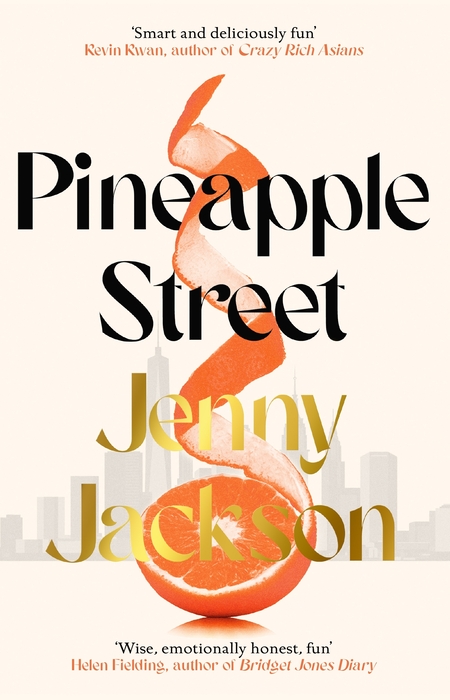(courtesy Penguin Books Australia)
There is a prevalent idea out there that having money somehow solves all of a person’s problems.
Driven no doubt by those without than those with who likely know all too well that while money might make you happy, or at least comfortable, it does not remove you from the scourge of life’s unthinking and unfeeling ills, the evocation of financial security as a buffer against the worst aspects of being alive is a beguiling one that draws from our fervent wish for release from the stress of existential angst.
Alas, in Jenny Jackson’s delightful novel, Pineapple Street – the title is drawn from a group of thoroughfares in Brooklyn, New York known as the “fruit streets” (cranberry, orange and, of course, pineapple) – there is no bank balance-triggered magic waving of the wand for sisters Darley and Georgiana and their sister-in-law Sasha who discover that having money doesn’t suddenly magic life into some sort of pleasingly cohesive and purposeful shape.
That’s not to say that any one of these beautifully realised women, who grapple as we all do with the better and lesser angels of our nature, are naïve enough to think this might be the case; rather that, as they seek to transition from one stage of their lives to another they find themselves in the exact place as anyone else, with money often proving to be more of a hindrance than a help.
Everyone laughed, Cord walking up to rub her shoulders to make sure she thought it was funny too, and Sasha played along, knowing deep in her heart that she would never wear a white blouse to a Stockton family party again as long as she lived.
The Stockton family is old money from way back and like all members of New York’s moneyed elite, they are afforded a certain level of privilege and a measure of immunity from the very worst life can throw at us.
But life still happens to you whether you are wealthy or not and all three women, who are fully 3D in their humanity in a way that will make you warm to them even at their worst, are caught in the unexpected consequences of life decisions.
Darley, who’s in an enviably happy marriage to grounded and funny whizkid Malcolm, the son of Korean immigrants to the USA made exceptionally good, long ago decided to forgo her trust fund in order to devote herself fully to being a mum.
She doesn’t regret the decision overall but when circumstances change, she begins to wonder if perhaps she yielded too much and whether she placed too much trust in the surety and beneficence of what once looked like a wholly rosy future.
Meanwhile Sasha, married to the only Stockston son, Cord, who may be a little emotionally disengaged at times but who ultimately loves his wife deeply, is grappling with what it means to come from lower middle class standings to high wealth; she’s never been greedy for money and her struggles are all to do with how you handle life when money is suddenly no longer an issue to an almost excessive degree.
(courtesy official Jenny Jackson Twitter account)
Finally Georgiana, the youngest member of the three women of the younger Stockton generation, is finding it hard in her early twenties to know which way is existentially up and whether there is much to be gained by simply giving it all away, a dilemma of epic proportions that takes places against a slow brewing love affair with a man who may be bad news but who could just as easily be the best person to have walk into her privileged life.
Caught in a range of challenging situations that would test the emotional tenacity and intelligent decision-making of anyone, these three women form the emotional heart and soul of Pineapple Street, a novel which surges and rises on a buoyant sense of life being ultimately solvable and dealable.
For all the emotional weightiness of the grand dilemmas facing these three impressive younger women, who have their heads screwed on right and their hearts mostly in the right place (save for the terrible way Darley and Georgiana treat Sasha at first) and who will win at life if they can just work out how to handle the obstacles lining their ways forward, Pineapple Street is a remarkably cheery and sparklingly light read that neatly balances some weighty emotional matter with a lighthearted tone that is as comedically rich as it insightfully thoughtful.
Even as it muses on what the back blurb of the novel calls “the peculiar unknowability of someone else’s family”, and thinks deeply about how the chasm between the haves and have-nots manifests itself, it serves up some heart-singingly fun and lovely rom-com vibes which leaven out the darker moments of the story nicely.
‘Ask the Gold Digger,’ Georgiana said, glaring at Sasha, who stood frozen at the end of the hall. ‘Ask the f**king Gold Digger.’ And with that she swept out of the apartment and left her family gapping in her wake.
That is, really, Jackson’s great accomplishment with Pineapple Street.
She magically manages, and honestly not magical at all really because she, clearly from the first word on the opening an accomplished and emotionally insightful writer, to forge two quite disparate elements into the one highly readable novel.
It’s rare to have a book be both charmingly buoyant and emotionally searing but Pineapple Street does it with élan, following in the likes of a lot of Scandinavian pop music which often marries upbeat melodies with lyrically dark incisiveness to persuasively listenable effect.
At no point does either element compromise or cancel out the other, manifesting together as a delightful story that captures your mind with its thoughts on a whole range of personal and societal issues while also firing up the hope and optimism implicit to genres that celebrate redemption, growth and the ever-elusive happy-ever-after ending.
Often simultaneously funny and meaningful, Pineapple Street is a gem of a read because while it occupies a milieu of human existence few of us will ever experience firsthand, it is also groundedly accessible, touching on what it means to be human on a whole range of issues and in a multiplicity of circumstances, and proving that while money does obviously make a difference, it doesn’t inoculate you against the vicissitudes and challenges of life and that in the end, a little bit of self-aware, open and willing to change humanity, not to mention empathy, goes a long, long way.

